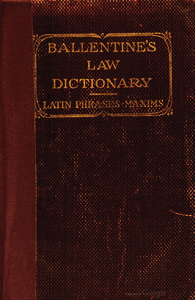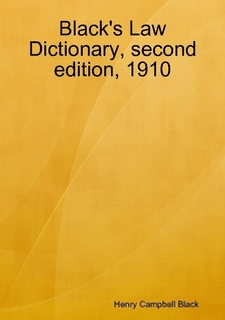A transfer. See 7 Am. St. Rep. 331.
Definition of Assignment
-
Ballentine's Law Dictionary
-
Black's Law Dictionary: 2nd Edition
In contracts. 1. The act by which one person transfers to another, or causes to vest in that other, the whole of the right, interest, or property which he has in any realty or personalty, in possession or in action, or any share, interest, or subsidiary estate therein. Seventh Nat. Bank v. Iron Co. (C. C.) 35 Fed. 440; Haug v. Riley, 101 Ga. 372, 29 S. E. 44, 40 In In A. 244. More particularly, a written transfer of property, as distinguished from a transfer by mere delivery. 2. In a narrower sense, the transfer or making over of the estate, right, or title which one has in lands and tenements; and, in an especially technical sense, the transfer of the unexpired residue of a term or estate for life or years. Assignment does not include testamentary transfers. The idea of an assignment is essentially that of a transfer by one existing party to another existing party of some species of propertv or valuable interest, except in the case of an executor. Hight v. Sackett, 34 N. Y. 447. 3. A transfer or making over by a debtor of all his property and effects to one or more assignees in trust for the benefit of his creditors. 2 Story, Eq. Jur. § 1036. 4. The instrument or writing by which such a transfer of property is made. 5. A transfer of a bill, note, or check, not negotiable. 6. In bankruptcy proceedings, the word designates the setting over or transfer of the bankrupt's estate to the assignee.
—Assignment for benefit of creditors. An assignment whereby a debtor, generally an insolvent, transfers to another his property, in trust to pay his debts or apply the property upon their payment. Van Patten v. Burr, 52 Iowa, 518, 3 N. W. 524.
—Assignment of dower. Ascertnining a widow's right of dower by laying out or marking off one-third of her deceased husband's lands, and setting off the same for her use during life. Bettis v. Mc-Nider, 137 Ala. 588, 34 South. 813, 97 Am. St Rep. 59.
—-Assignment of error. See Error.
—Assignment with preferences. An assignment for the benefit of creditors, with directions to the assignee to prefer a specified creditor or class of creditors, by paying their clnims in full before the others receive any dividend, or in some other manner. More usually termed a "preferential assignment."
—Foreign assignment. An assignment made in a foreign country, or in another state. 2 Kent, Comm. 405, et seq.
—General assignment. An assignment made for the benefit of all the assignor's creditors, instead of a few only; or one which transfers the whole of his estate to the assignee, instead of a part only. Royer Wheel Co. v. Fielding, 101 N. Y 504, 5 N. E. 431; Halsey v. Co.nnell, 111 Ala. 221. 20 South. 445; Mussey v. Noyes, 26 Vt. 471,
—Voluntary assignment. An assignment for the benefit of his creditors made by a debtor voluntarily; as distinguished from a compulsory assignment which takes place by operation of law in proceedings in bankruptcy or insolvency. Presumably it means an assignment of a debtor's property in trust to pay his debts generally, in distinction from a transfer of property to a particular creditor in payment of his demand, or to a conveyance by way of collateral security or mortgage. Dias v. Bouchaud, 10 Paige. (N. Y.) 445.

